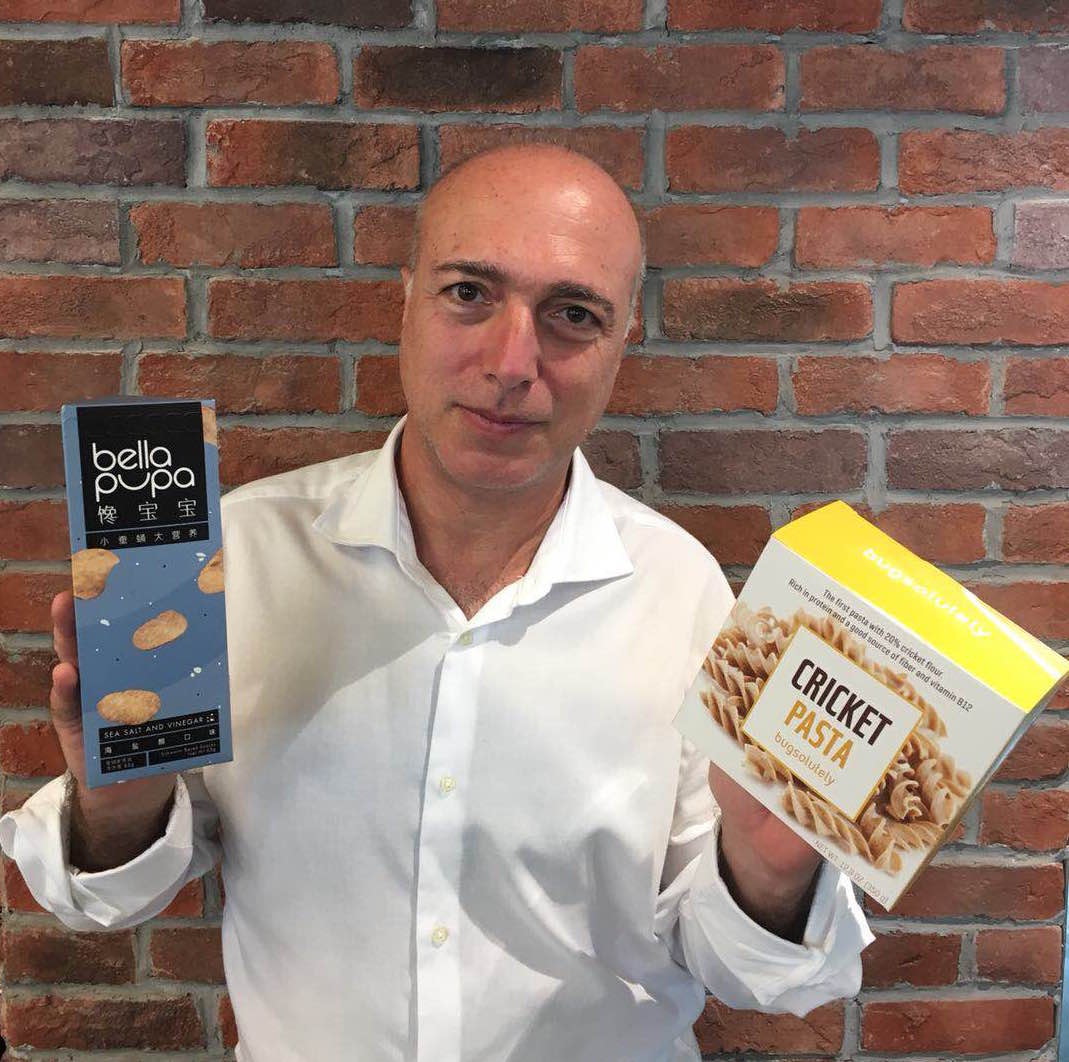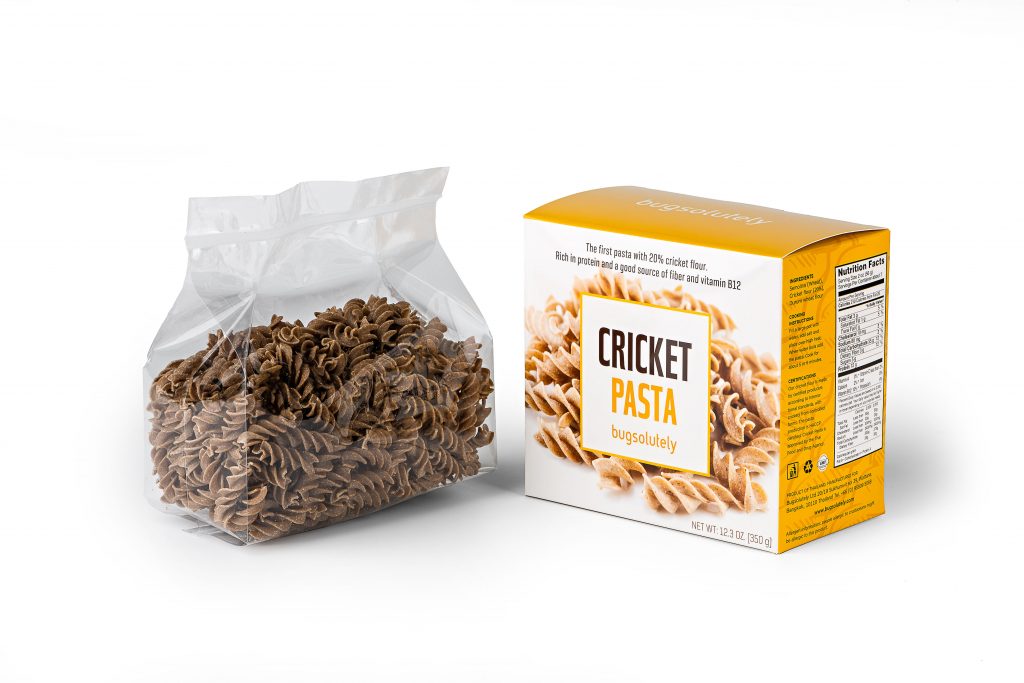AMONG the champions of the edible insect revolution in Asia, Bugsolutely is changing the way snacks and pasta are packed with protein. The company has operations in Thailand and China, and exports its products to Europe and the United States.
At the Global Food Innovation Summit held in May 2018 at the MiCo Milano Congressi, Bugsolutely founder Massimo Reverberi was a presentor in a session on Food& Health - The Future of Nutrition. Mr Reverberi is also one of the resource speakers at Ringier's Asia Food and Beverage Summit in Jakarta, on 4-5 September 2018.
FoodPacific Manufacturing Journal talks further with Mr Reverberi to know how the company has been harnessing the benefits of crickets and silkworm to make their products equally high on nutritional value as they are sustainable to produce.

With an eye toward the future, Massimo Reverberi raises the bar for food nutrition and sustainability with Bella Puppa silkworm snack and Bugsolutely Cricket Pasta.
When did the idea of using cricket flour hit you?
I had the idea in 2015 after a friend asked me to investigate the nutraceutical properties of edible insects farmed in Thailand. In Thailand, the common House Cricket and the Gryllus Bimaculatus are the most common farm species. We do not farm crickets. Cricket farmers sell crickets to cricket flour producers and we buy the flour from them.
What’s the make-up of your pasta?
Our product is made with 80% pasta –like a traditional Italian pasta–and 20% cricket powder. Cricket powder is 100% crickets, dried and ground whole. Instead, we can eat only 40% of a cow. This is one of the many reasons why edible insects are sustainable.
What makes bugs in general and crickets in particular–a superfood?
Crickets have exceptional nutritional values and include high levels of protein (up to 67% in powder), non-dairy calcium, iron, other minerals, vitamin B12 and Omega fatty acids, to mention a few. Other farmed insects, such as silkworms and mealworms, contain a little less protein and more fat, but are still a superfood. Silkworms for example are also good for blood pressure and reducing glucose in blood.
Then there’s also the sustainability issue that insect-based products address. Could you walk us through that?
A cow needs 10 times more feed and 1,000 times more water than crickets, to get the same kilogram of meat. They also produce gas emission 100 times more than insects. Beef is our real ecological challenge. Chickens are much better, and pigs are in the middle, environmentally speaking. But insects beat them all. Silkworms, for example, feed just on mulberry leaves from mulberry trees and do not need water. A perfect circular economy. They also provide silk. Only in China the production is 500,000 tons of silkworm pupa per year.
Then again, what does it entail to farm crickets?
There are two farming models. The Asian one: small farms, managed as a side business by farmers. The cost of land and labour is very, very small. Then there’s the Western model, the digitally controlled, vertical factory farming, which in my opinion may lead to higher cost in the future. At the moment one kilogram of cricket flour in Thailand may cost €20, and in Europe more than €100.

Pasta with cricket powder from Bugsolutely. Crickets have high levels of protein, non-dairy calcium, iron, other minerals, vitamin B12 and Omega fatty acids.
Do you use only those farmed in Thailand? Why so?
For the price difference. Five times less than Europe!
Where are you currently marketing your products and how has acceptance been so far?
Bugsolutely Thailand produces Cricket Pasta for western countries. We have some retailers in the world but we aim at the US and European markets. The problem with Europe is the legislation. The approval process is slow, and we will not see insects as a legal food ingredient before 2019.
You also produce snack food that uses silkworm. What inspired that?
I was invited by the first food accelerator and food venture capitalist of China to develop the first silkworm powder-based snack in the world. It seemed so promising from the beginning! Silkworms are a by-product of the silk industry and have been farmed for 5,000 years without any problems. Their cost is lower than mealworms and their taste is as good as that of other insects.
How do silkworms compare to crickets?
They contain many minerals, vitamins and protein like the crickets, but not exactly the same and not in the same proportion. But in terms of health, the result is the same: a superfood. When asked by the Chinese agency what is the food for future space mission, a University replied with an academic paper saying: silkworms.
Manufacturing of your snack food is in China, whereas the pasta is in Thailand. Do you see these changing with manufacturing of both products done interchangeably in both locations?
The tradition of silkworms in China and crickets in Thailand leads to develop a model of distributed micro farming that works very well from an economical perspective. Many farms are located in areas with a warm or tropical climate, which is also something that helps reduce the costs because insects love high temperatures. China has a gigantic silk market, therefore I do not imagine any other country bating China on the price of silkworm for a very long time. Thailand has a perfect climate for cricket farming.
How are you influencing people’s mindsets toward your products?
Cricket Pasta is meant for western consumers, while for 2018 the silkworm snack Bella Pupa will focus on the Chinese market. Our activities include a lot of social media marketing, educational initiatives and speeches at food events. People simply do not know farmed insects are clean, sustainable, tasty and ecologically friendly. Therefore communication is the key. Once the people understand the concept, and realize that a shellfish is not much different from a cricket, they see how eating insects makes sense.
What countries outside of Asia are opening up to the concept of protein-rich insects? Do you think it’s moving at an expected pace?
The pace is slower than expected, mostly because of the legal aspects. Many countries do not mention insects as food, or need a long approval process to accept it. It is not the case in the US, Canada or Australia, which are okay with farmed insects, but Europe and some other Asian countries never regulated insects as food.
Breaking into the market has its share of joys and challenges. Could you share some of yours?
That’s right. The community of start-ups producing food with insects is thrilled by the opportunities. We feel like we can really change the food system and contribute to feed 10 billion people in 2050 in a sustainable way. It is so strange that we’ve forgotten insects as a potential yummy, nutritious food in so many countries for such a long time. But it is challenging to change people’s preconception, because it is irrational and nested deep down our western habits. Farmed insects are actually clean and good looking, if we think rationally. An oyster or a shrimp looks much more a “monster” to me, visually speaking, than a cricket.
How do you address the issues of quality and food safety for your products?
As mentioned earlier, silkworms are fed with mulberry leaves, and they do not drink water. As for any farmed insects, they would not tolerate antibiotics or hormones, and clearly pesticides would also be a problem if anywhere near them. We buy the flour from a certified supplier, and it is food grade. The cricket flour comes from a HACCP-certified producer who buys the crickets from farms following their requirement for food safety. We run regularly lab tests on bacteria, and have never found anything.
Are there regulation issues that still need to be addressed?
In China, only the silkworm is listed officially as a food. In the European Union, insects need to be approved, and some of them will be approved in 2019. Some countries are not following this decision, and already allow edible insects. In the United States, Canada and Australia, farmed insects are considered totally okay by the food agencies. In many other countries, there is a complete lack of regulation, which I hope will be fixed in a few years.
What positive developments in the food sector have transpired since you launched your product and how are these giving bug-based food sources like yours a push?
Most of the insects eaten in the world were just collected and farming is something that has never been analysed and optimised on an industrial scale. That is why the costs are still high. Chickens are so cheap because we have been working on breeding them industrially for decades. But year after year I can see improvements in insect farming and flour processing, and costs are decreasing, so I guess it is just a matter of time and R&D. Silkworms are already very cheap because we’ve been herding them for 5,000 years, and the production is already on a large scale.
Where are you setting your sights next in terms of producing and marketing products?
We made one kind of pasta and two flavours of silkworm snack. We will develop more products in these two food categories as they are very popular and matches well the integration of insect powder.
Interview by JEAN ALINGOD
Boardroom Connection: Massimo Reverberi
Position: Founder
Company: Bugsolutely
E: massimo@bugsolutely.com
Thailand:
T: +66 (0) 8 5239 2542
A: 20/19 Sukhumvit soi 39, Bangkok, 10110 Thailand
W: www.bugsolutely.com
China:
T: +86 155-0213-6331
A: 3F, Bld. 5, 436 Jumen Road, 200023 Shanghai
W: www.bugsolutely.cn/eng
Air Jordans

 iConnectHub
iConnectHub
 Login/Register
Login/Register Supplier Login
Supplier Login



























